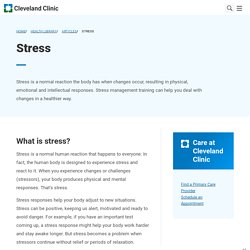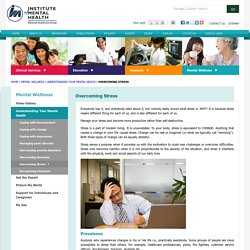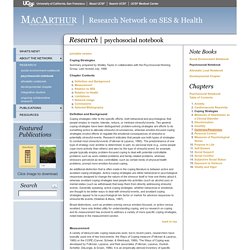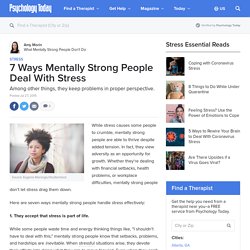

Stress: Signs, Symptoms, Management & Prevention. What is stress?

Stress is the body's reaction to any change that requires an adjustment or response. The body reacts to these changes with physical, mental, and emotional responses. Stress is a normal part of life. You can experience stress from your environment, your body, and your thoughts. Even positive life changes such as a promotion, a mortgage, or the birth of a child produce stress. Cleveland Clinic is a non-profit academic medical center. How does stress affect health? The human body is designed to experience stress and react to it. Stress that continues without relief can lead to a condition called distress – a negative stress reaction. Stress also becomes harmful when people engage in the compulsive use of substances or behaviors to try to relieve their stress.
Types of Stressors (Eustress vs. Distress) Background info positive negative stress. Hrinasia. Singaporeans among the most stressed at work globally Women suffering more from ‘always on’ corporate culture Only 31% of Singaporeans financially prepared for old age SINGAPORE – March 26, 2019 – Global health service company Cigna Corporation (NYSE:CI) today released the results of its 2019 Cigna 360 Well-Being Survey – Well and Beyond.

TODAYonline. SINGAPORE — Singaporeans are not only sleep deprived, but they are also among the most stressed at work globally, according to a survey by health service company Cigna released on Tuesday (Mar 26).

Nearly 92 per cent of Singaporeans surveyed were stressed from work, which was higher than the global average of 84 per cent. Of this group, 13 per cent said that the stress they faced was unmanageable. Singaporeans’ physical wellness index also dipped by 4.4 percentage points from last year, which the survey attributed to an increase in sleepless nights. Of the 23 markets surveyed, Singapore had the fifth lowest wellness index, which was measured across five key indices — family, financial, physical, social and work. Singapore fell by a place from last year as its wellness index went down by 1.7 points to 57.8. The survey collated about 13,200 responses from over 24 countries, with a sample of 502 respondents in Singapore. Read also “Vulnerability will make it seem that you are not as competent. 10 Most Stressful Life Events. We all experience stress in our life, but there are certain life events and even day-to-day situations that top the list when it comes to causing us stress.

Here are some of life’s major stressors – and tips on how to cope with them. 1) Death of a loved one The death of a spouse or other loved one tops the list of the most stressful things we experience. Bereavement affects people in different ways. You may feel shock and sadness, anger or even guilt. It’s important during this time that you take care of yourself. 2) Separation or divorce Separation and divorce are another two of life’s most stressful events.
There are things you can do to help reduce the stress of separation or divorce, such as surrounding yourself with a good support system, taking time to make any decisions and staying physically active. 3) Getting married On the flip side, getting married can also be one of life’s most stressful events. 4) Starting a new job 5) Workplace stressors 6) Financial problems 9) Retirement. My Job is Killing Me - Managing Your Stress. Overcoming Stress. Everybody has it, and everybody talks about it, but nobody really knows what stress is.

WHY? It is because stress means different thing for each of us, and is also different for each of us. Manage your stress and become more productive rather than self-destructive. Stress is a part of modern living. It is unavoidable. Stress serves a purpose when it provides us with the motivation to scale new challenges or overcome difficulties. Prevalence. MacArthur SES & Health Network. Printable version Coping Strategies Summary prepared by Shelley Taylor in collaboration with the Psychosocial Working Group.

Last revised July, 1998. Chapter Contents Definition and Background Coping strategies refer to the specific efforts, both behavioral and psychological, that people employ to master, tolerate, reduce, or minimize stressful events. An additional distinction that is often made in the coping literature is between active and avoidant coping strategies. Broad distinctions, such as problem-solving versus emotion-focused, or active versus avoidant, have only limited utility for understanding coping, and so research on coping and its measurement has evolved to address a variety of more specific coping strategies, noted below in the measurement section. back to top Measurement By contrast, the development of the COPE was theoretically guided, and items were created to tap a predetermined set of coping strategies.
Relation to SES Relation to Health Limitations Network Usage Conclusions. 7 Ways Mentally Strong People Deal With Stress. Source: Eugenio Marongiu/Shutterstock While stress causes some people to crumble, mentally strong people are able to thrive despite added tension.

In fact, they view adversity as an opportunity for growth. Whether they're dealing with financial setbacks, health problems, or workplace difficulties, mentally strong people don't let stress drag them down. article continues after advertisement Here are seven ways mentally strong people handle stress effectively: 1. While some people waste time and energy thinking things like, "I shouldn't have to deal with this," mentally strong people know that setbacks, problems, and hardships are inevitable. 2. Rather than think that a flat tire has the power to ruin their whole day, mentally strong people keep inconveniences in proper perspective. 3. Mentally strong people recognize the importance of keeping their bodies in smooth operating condition.